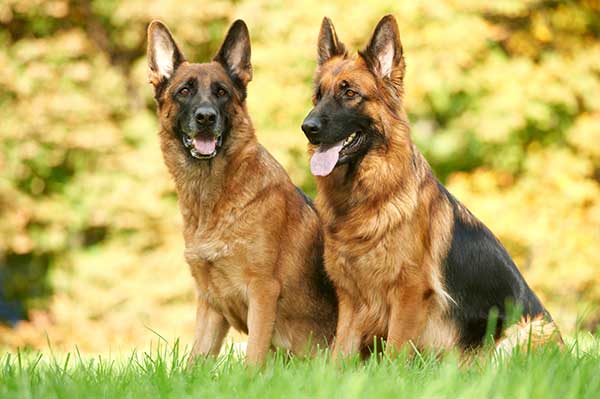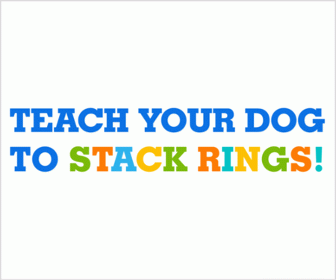When planning to bring a German Shepherd home, many pet parents are usually ill-prepared in terms of how to keep their dog happy. That’s perfectly understandable, as they simply cannot visualize a situation where their German Shepherd would be sad.
But like any other dog, German Shepherds do get sad from time to time. As a responsible pet parent, you should move with haste to establish the underlying cause of your German Shepherd’s bad mood. That’s the only way you’ll be able to adopt the right solutions to cheer the dog up.
Now, there are several tips you can implement to make your German Shepherd happy. You can choose to keep the dog stimulated either through rigorous exercise or by offering him plenty of toys. You might also consider spending more time with your German Shepherd, especially if the dog’s sadness has a lot to do with boredom and loneliness. Treats have also proven to be effective in helping to cheer up gloomy German Shepherds. And when it comes down to it, don’t hesitate to enlist the services of a professional vet.
Generally, how you go about cheering up your German Shepherd comes down to the underlying cause of his sadness.
Read on as we expound on the topic further. Some of the areas we shall highlight include the common causes of sadness among German Shepherds, as well as some of the top tips on how to make them happy.
Why Is My German Shepherd Sad?
Like all animals, dogs have an in-built cell-signaling system known as the endocannabinoid system. The primary role of the endocannabinoid system is regulating your German Shepherd’s homeostatic balance. Some of its core functions include relief from pain and anxiety, alleviation of inflammation, as well as regulation of the dog’s circadian rhythms and mood.
The endocannabinoid system is made up of three major components. They include endogenous cannabinoids (also known as endocannabinoids), endocannabinoid receptors, and a series of hormones and chemicals.
One of the chemicals comprising the system is known as serotonin. Serotonin is commonly referred to as a ‘feel-good’ neurotransmitter because it enhances the feelings of happiness among animals. When the levels of this chemical fall below certain levels, your German Shepherd is bound to become sad.
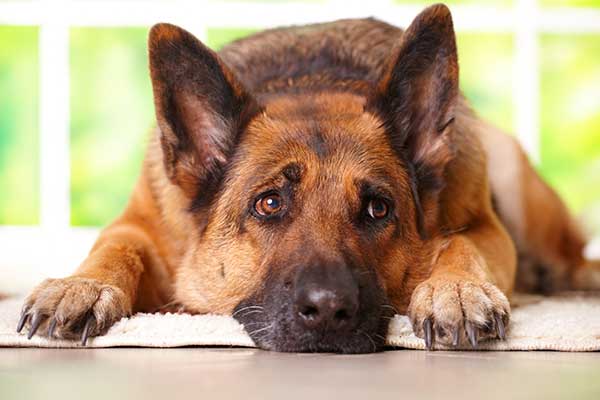
Another common cause of sadness among German Shepherds is loneliness and boredom. This happens when a dog is abandoned for extended durations of time, and particularly if his owner doesn’t make enough provisions to keep their canine friend stimulated.
It’s important to note that boredom and loneliness lead to one of the worst forms of sadness among German Shepherds. If this sadness is not addressed urgently, it can degenerate to separation anxiety.
Separation anxiety is one of the worst anxiety disorders in dogs. The disorder manifests in a wide range of symptoms, including obsessive-compulsive behaviors like excessive chewing, barking, growling, or howling.
In addition to boredom, loneliness, and a decrease in the levels of serotonin, the following are other common reasons why your German Shepherd may be sad;
- Pain resulting from an illness or physical injury.
- Drastic changes to the dog’s routine, such as changes in his feeding hours.
- Underlying medical conditions, such as post-traumatic stress disorder.
- Poor feeding habits.
- Poor exercise habits.
- Inadequate grooming and petting.
- Poor socialization and training.
- Parasite infestation.
Last update on 2024-12-23 / Affiliate links / Images from Amazon Product Advertising API
Why Is It Important For My German Shepherd To Be Happy?
A cheerful dog translates to a happy home; there are no two ways about that. The image of a happy German Shepherd puppy frolicking in your front yard is simply surreal. It can make an otherwise boring day lively and colorful.
According to numerous studies, a dog can also help to lessen the symptoms of anxiety and depression. Some studies even suggest that dogs can help to improve the signs of autism, as well as help children learn to read. You can only enjoy these benefits with a happy dog.
So, if you frequently suffer stress and mood disorders, making your German Shepherd happy is one of the best ways to keep anxiety at bay.
A happy German Shepherd also increases the levels of the ‘love hormone’ oxytocin. This hormone is instrumental in helping you to bond and just relax with your dog.
If you’re struggling to spend quality time with your German Shepherd, the chances are that you’ve not done much to cheer the dog up. As soon as the dog is happy, he will be more receptive to petting. And since a happy dog has positive effects on the levels of the hormone oxytocin, you’ll not experience challenges petting or grooming your German Shepherd.
Lastly, there are lots of health benefits that a German Shepherd will accrue by being happy. For instance, did you know that happiness counteracts the effects on stress hormones like cortisol?
So, keeping your German Shepherd happy will ensure that he doesn’t develop anxiety or anxiety-related complications like depression, constipation, and weight gain.
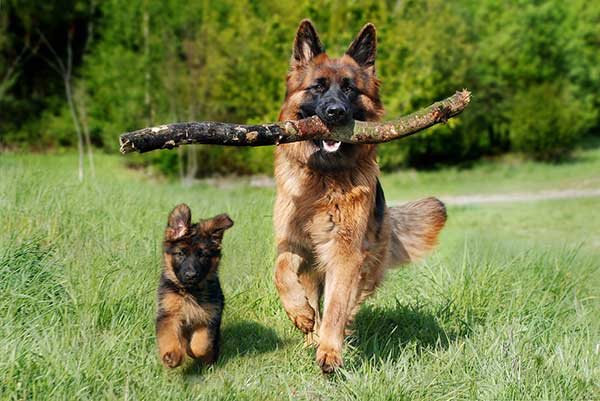
Signs of a Happy German Shepherd
It’s not unusual to come across a pet parent wondering, how do I know if my German Shepherd is happy? Well, there are numerous tell-tale signs that your German Shepherd is lively and cheerful.
Some of those signs include;
- High and waggy tail.
- Floppy ears, as opposed to ears that are tense and flattened against his head.
- Relaxed body posture, as is characterized by loose shoulders and soft eyes.
- Playful gestures, such as the play ‘bow’.
- Affection- or attention-seeking behavior, such as the dog coming and leaning against your body.
Signs of an Unhappy German Shepherd
If you’ve observed your German Shepherd and noticed that he doesn’t exhibit any of the above signs, then the chances are that the dog is unhappy.
But to be sure, watch out for the following signs;
- Low and/or tucked tail.
- Ears pinned back and flattened against his head.
- A tensed body position, marked by holding their head low and avoiding eye contact.
- Hiding or walking away from you.
It’s important to reiterate that while sadness in dogs is often tied to aggression, a German Shepherd can be sad but not necessarily aggressive. The fact that the signs of sadness and aggression are almost identical makes it even more difficult to tell whether your dog is unhappy or aggressive.

Tips on How to Keep Your German Shepherd Happy
1. Train the Dog
One of the most effective methods to make your German Shepherd happy is to train the dog. Basically, there are two training options you can consider, namely agility training and obedience training.
Agility training is particularly important where you’d wish for your German Shepherd to take part in professional competitions. You can perform this training either in your backyard or at a dog park nearby.
The good news is that most German Shepherds respond favorably to agility training. However, since each dog is unique, your German Shepherd may not necessarily respond well to this training. According to experts, you should establish your dog’s responsiveness to agility training early enough – usually when he is about three to four months old.
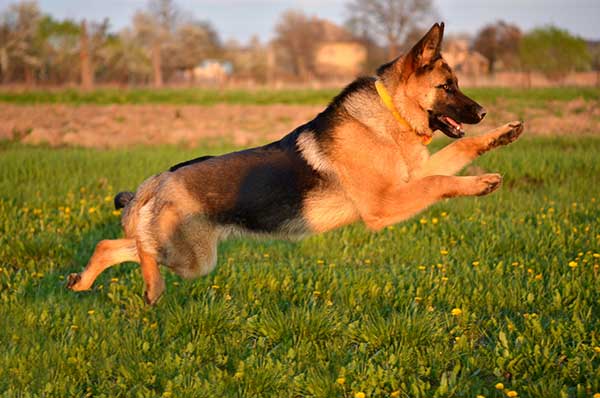
Obedience training may be less demanding compared to agility training, but it also goes a long way in helping to keep German Shepherds happy. Plus, it’s a special training aimed at making the dog calm and well-mannered, especially in public.
When it comes to obedience training, the goal isn’t just to make your German Shepherd obey basic commands. Instead, the training should be comprehensive enough to foster the dog’s physical and mental development.
You can start with an obedience class where you impart basic commands on him. As soon as the dog is acquainted with routine orders, you can now introduce more challenging physical and mental tasks.
2. Consider Early Socialization
Early socialization works wonders in imparting good behavior in dogs. It can also be useful when trying to make your German Shepherd happy. Experts advise that puppies should be socialized as early as possible to help them get along with humans and other dogs.
For instance, you might consider hanging out with your German Shepherd in a dog park or going for walks together in the neighborhood every morning. You might also ensure that the dog accompanies you each time you visit the mall or grocery store.
A German Shepherd that’s used to public places, such as parks, bars, and bazaars will be more receptive to the idea of going out. Having been familiarized with the world, such a dog will not be startled by the sound of fireworks or the flashing street lights.
3. Take Care of the Dog’s Dietary Needs
The significance of a healthy and well-balanced diet cannot be overemphasized. Like other animals, dogs don’t just eat to become satiated. Food also helps to keep them physically fit and emotionally upbeat.
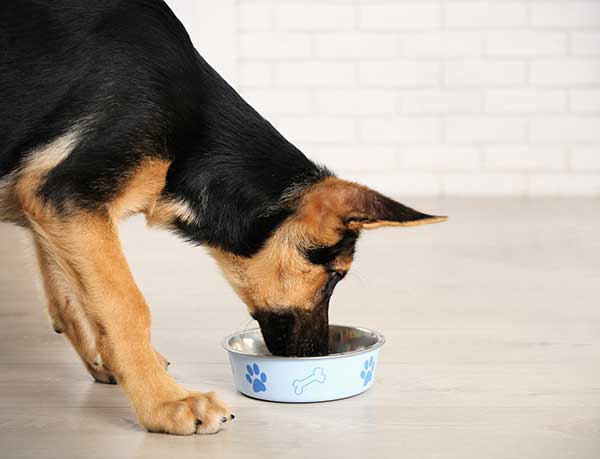
The first step in feeding your German Shepherd properly is understanding the foods that constitute his staple diet. Contrary to popular belief, dogs are omnivores. That means they thrive on a diet of animal protein and some greens.
However, dogs require only small amounts of green matter in their diet. So, when it comes to introducing your German Shepherd to fruits and vegetables, go slow on it and observe how the dog responds to the new food.
If you’re ever in doubt, you can simply continue with the commercially-prepared dog foods that you’ve been offering your German Shepherd.
As long as those products are manufactured by reputable brands, the chances are that they’re already formulated with all the essential nutritional elements that dogs need to thrive.
After establishing the right quality and composition of foods to feed your German Shepherd, the next thing to do is determine the portions. Essentially, that will depend on various factors, including the dog’s age, level of activity, and general health condition.
You can either use your best judgment or consult your vet for more insights. Remember that both overfeeding and underfeeding your German Shepherd have adverse effects on his overall mood and happiness.
Lastly, serve your German Shepherd in clean bowls and ensure that he always has access to water. Just like humans, the condition of a dog’s feeding bowl determines whether he will enjoy his meal or not. Plus, clean feeding bowls help to keep diseases at bay.
Last update on 2024-12-19 / Affiliate links / Images from Amazon Product Advertising API
4. Keep the Dog Stimulated
Keeping your German Shepherd engaged is one of the surest ways to kill loneliness and boredom.
Research has proven that working out frequently has positive effects on the body’s serotonin levels, ultimately banishing sadness and improving the mood.
Exercising your German Shepherd will also help to redirect his aggression and frustration. That’s because exercise provides the dog with an alternative avenue through which he can channel his pent-up energies. With a well-exercised German Shepherd, you’ll never have to worry about coming back home to destroyed furniture and upholstery.
There are several things you can do to keep your German Shepherd physically and mentally stimulated. For instance, you can offer him toys or puzzle games. You can also allow the dog to watch television or register him for a dog training class.
5. Spend More Time With the Dog
Due to our fast-paced ways of life, it may be difficult to spare time out of our busy schedules to spend with our canine friends. But leaving your German Shepherd for days without petting or cuddling him is consigning the dog to a life of sadness.
Even if you’ve already made provisions for toys, puzzle games, and other forms of entertainment, you should still spare some time to hang out with your pooch in person. You can consider playing the game of fetch together. It helps to tire the dog down while also improving your relationship with him.
Another way to spend more time with your German Shepherd is to go on walks together. While you’re at it, ensure that the dog is on a leash the whole time, especially if he has a strong prey drive.
Other activities you can perform along with your German Shepherd include swimming and even yoga.
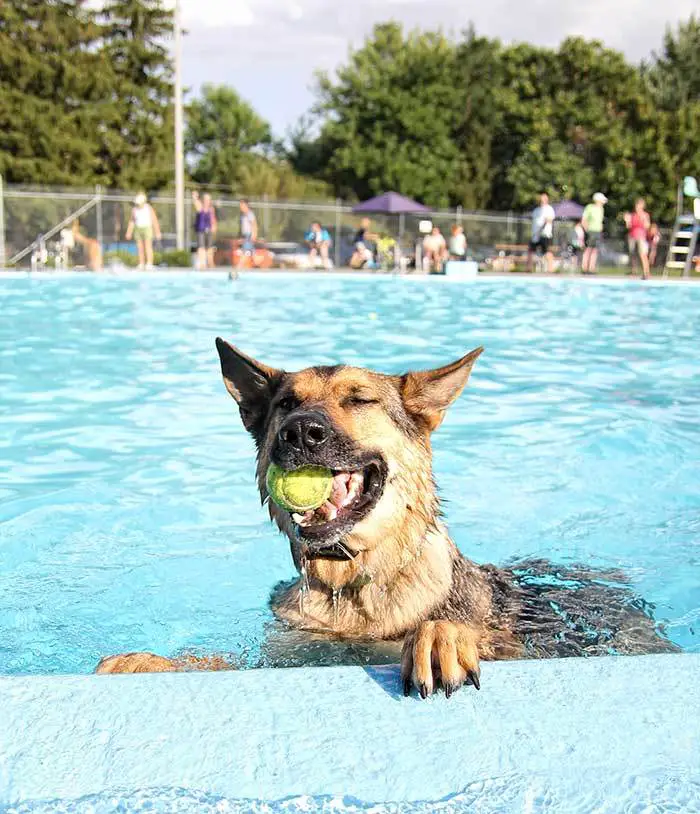
6. Bath the Dog
Bathing your German Shepherd will help to keep him clean and parasite-free. Remember, parasite infestation is one of the major causes of sadness among dogs. So, keeping your German Shepherd parasite-free through routine baths is an excellent way to make him happy.
A bath also comes with some therapeutic effects. But remember that dogs are generally averse to the idea of bathing, so don’t go about bathing your German Shepherd every other day. Once a month is just fine.
Suffice to mention, bathe your dog using dog-friendly products to avoid hypersensitive skin reactions. And when you’re done, rinse his fur thoroughly to remove all foam from his coat, then allow his skin to air-dry.
Avoid blow-drying the dog as that may also cause skin dryness and irritation.
ALSO READ: How To Clean A Dog Without A Bath (9 Tips)
7. Offer Him Treats
All German Shepherds love treats. Treats are mostly used to reinforce good behavior, especially when training them. Treats also play a role in making them happy.
Since all German Shepherds are not made equal, you’ll first begin by establishing the kind of treats that your dog loves. Common treats include dog bone and seafood.
After establishing the treats that your German Shepherd loves, offer the treat to the dog occasionally and in moderation. Overdoing it might cause him to lose interest in it.
It’s also worth noting that most treats come in the form of unhealthy foods. So, even if the dog doesn’t lose enthusiasm in it, the treat may present long-term health complications if fed to the dog with careless abandon.
- SUPPLEMENT A HEALTHY HEART for your dog with Stella’s Solutions Dinner Mixers. This always-tasty dog food topper – with levels of taurine (250 mg per…
- ALL-NATURAL, ACTIVE INGREDIENTS like chicken heart and sardines (both excellent natural sources of taurine) for overall heart health. Stella’s…
- MADE IN THE USA in Stella & Chewy’s own Wisconsin kitchen with cage-free chicken. Every ingredient is responsibly sourced and never from China.
Last update on 2024-12-23 / Affiliate links / Images from Amazon Product Advertising API
8. Treat the Dog to a Nice Vacation
A nice vacation is another excellent strategy in keeping German Shepherds happy. Depending on the destination you choose, a vacation with your German Shepherd can also help to strengthen the bonds of love and affection that exist between the two of you.
And since you’ll be joining the dog on the trip, you’ll also have plenty of time to escape from the hustle and bustle of your everyday life. So basically, a vacation is a thrill-inspiring experience both to a German Shepherd as well as his owner.
Now, there are a few things to keep in mind before taking your German Shepherd for a vacation. First, book a ticket with an airline company that accommodates dogs the size of a German Shepherd. If you’re going on a road drive instead, customize the car to ensure that the dog gets unhindered views of the scenic beauty.
Secondly, do your due diligence to hone in dog-friendly accommodation facilities. Here, you can liaise with local tour operators who will be able to customize your holiday package to suit the needs of your pooch.
Lastly, remember to maintain the dog’s routine. That means feeding him the foods he is used to, as well as maintaining the feeding and sleeping hours.

9. Hire a Dog Walker
You may have purchased the most interactive toys for your German Shepherd. But if your schedule won’t allow you to spend time with your dog every day, at least hire someone who can. That’s where a dog walker comes in.
An experienced dog walker will know exactly when your German Shepherd needs some exercise and when it’s best to let him rest.
In addition to exercising your dog, the dog walker will also ensure that your pooch feeds and drinks as he should. Most importantly, they will report any signs suggesting that the dog is a bit under the weather.
There are plenty of websites and apps that you can use to hunker down on a professional dog walker. Just be sure to hire someone with prior experience working with German Shepherds.
ALSO READ: 15 Tips for Walking Your Dog at Night
10. Consult Your Vet
It may happen that your German Shepherd doesn’t cheer up even after implementing all of the above tips. In such cases, your dog might be grappling with an injury or medical condition that’s affecting his overall mood.
An injury is somewhat easy to diagnose. However, a medical condition will require the professional diagnosis of your vet. The vet will examine the dog and establish whether he is suffering from any underlying illness that’s affecting his happiness.
If a disease is present, the vet will recommend the right treatment, ensuring that your dog recovers from the illness while seamlessly regaining his happy and playful ways.
Even if no disease is found in your German Shepherd, your vet will offer you a raft of other tips you can follow to make the dog happy.
- ACTIONABLE HEALTH INSIGHTS: Test for over 270 genetic health conditions and get actionable insights to help you give your pup the best care possible….
- MOST ACCURATE BREED IDENTIFICATION: Test for over 350 dog breeds including dingoes, coyotes, wolves, and village dogs. Using a research-grade…
- TRAIT INSIGHTS THAT HELP YOU BE MORE PREPARED: Test for 55 physical traits. Size, coat, grooming needs — your dog’s traits don’t just make them…
Last update on 2025-01-13 / Affiliate links / Images from Amazon Product Advertising API
Conclusion
We all strive to see our German Shepherds lively and cheerful. However, there are tons of reasons that could cause your German Shepherd dog to feel sad and lonely.
Fortunately, there are equally numerous ways that you can go about making the dog happy. Just remember to have your vet’s phone number on quick dial, just in case nothing seems to work.

